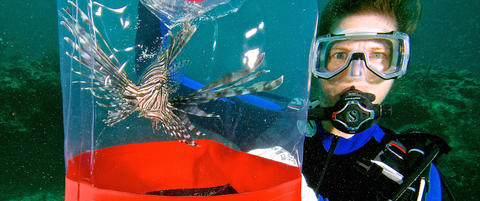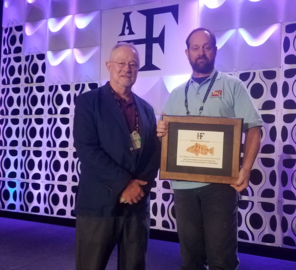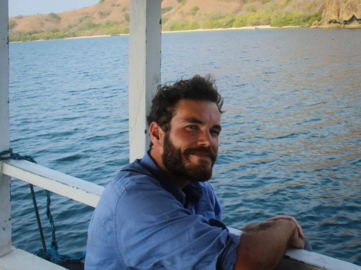A new scientific paper with results from REEF's Invasive Species Program research was recently published in the journal Conservation Science and Practice. The findings shed light on the factors affecting invasive lionfish intervention success and efficiency and how to best incorporate these findings into local management for invasive species. As part of a multi-year study with funding from NOAA Coral Reef Conservation Program and others, REEF and partners coordinated regional efforts by divers to cull invasive lionfish on 33 U.S.
REEF Co-Executive Director, Dr. Christy Pattengill-Semmens, was recently welcomed to the Women Divers Hall of Fame (WDHOF) in celebration of her achievements in ocean citizen science, education, and conservation. Although WDHOF was not able to hold their usual formal induction ceremony for Christy or the other five inductees of the Class of 2021 (or for the Class of 2020), Christy received her WDHOF pin in a short ceremony held at a DEMA awards dinner last month in Las Vegas.
REEF’s Grouper Moon Project was recently recognized with one of American Fisheries Society (AFS)'s highest honors, the William E. Ricker Resource Conservation Award. The Ricker Award is given annually, if warranted, to an individual or organization for a singular accomplishment or long-term contributions that advance aquatic resource conservation at a national or international level. The award was accepted on REEF's behalf by REEF Board member and longtime Grouper Moon scientist Dr. Scott Heppell at the annual AFS meeting last month.
We are saddened to share the news of the passing of one of REEF's early members, Edwin Steiner. Ed passed away earlier this year at the age of 92. Not only was he a pioneer in REEF's Volunteer Fish Survey Project, but Ed was also instrumental in the development of one of the key pieces of REEF's survey materials - the printed underwater survey paper. It was Ed's vision that brought the checklist and overall format of the underwater paper to life, and his prototypes are very similar to what we use today in all of our survey regions.
How do water temperature and overall climate changes impact marine life? Active Pacific Northwest REEF volunteer surveyor, Curtis Johnson, recently co-authored a new paper that seeks to answer this question for one species of interest, the Giant Pacific Octopus (GPO). The paper, published in the scientific journal Marine and Freshwater Research, is titled "Sea-surface Temperatures Predict Targeted Visual Surveys of Octopus Abundance".
Designing effective local management for invasive species poses a major challenge for conservation, yet factors affecting intervention success and efficiency are rarely evaluated and incorporated into practice. As part of a multi-year study with funding from NOAA Coral Reef Conservation Program and others, REEF and partners coordinated regional efforts by divers to cull invasive lionfish (Pterois spp.) on 33 U.S. Atlantic, Gulf of Mexico, and Caribbean protected coral reefs from 2013 to 2019.
The impacts of invasive lionfish (Pterois volitans/miles) on native coral reef populations in the Western Atlantic Ocean and Caribbean Sea can be enormous.
We are excited to welcome Hilary Penner to the REEF Team. As the new Education and Conservation Programs Manager, Hilary will develop community partnerships, create new youth learning opportunities, and engage REEF members to support our ocean conservation mission. While she's new to the staff, she not new to the organization; Hilary comes from a family of multi-generational REEF members and she herself has been involved with REEF for over two decades as a volunteer. Her first experience with REEF was on a Field Survey Trip to Bimini in 1996.
We are very excited to introduce the newest member of the REEF Team, Dr. Dan Greenberg. Dan will be working with REEF as a Research Associate for the next several months. He started work earlier this year to leverage REEF’s extensive Volunteer Fish Survey Project dataset, to estimate population trajectories and trends in abundance over space and time for various fish and invertebrate species. Prior to joining the REEF team, Dan was doing similar work as a Postdoctoral Fellow at Scripps Institution of Oceanography at UC San Diego.
The impacts of invasive lionfish (Pterois volitans/miles) on native coral reef populations in the Western Atlantic Ocean and Caribbean Sea can be enormous. However, how much lionfish differ from native predators and whether their effects outweigh the abundant mesopredators that occupy many reefs invite continued examination. The authors of this paper present empirical evidence from Caribbean Panama and beyond, suggesting that lionfish are less abundant than native mesopredators (e.g. small seabass).








